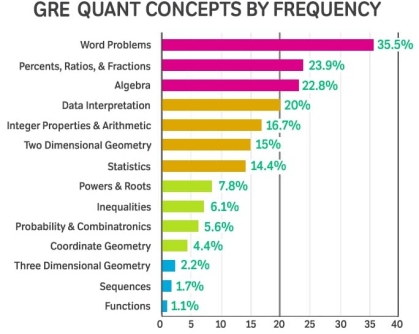Preparing for the GRE
If you’re thinking about or planning to apply to graduate school you have probably considered taking the GRE. The GRE opens the door for a lot of graduate schools. The GRE can be used to apply to master's, Ph.D. and professional degree programs.
What is the GRE?
The GRE is a standardized test administered by ETS. The GRE consists of three sections; a quantitative reasoning section, a verbal reasoning section, and an analytical writing section.
The quantitative reasoning section consists of math topics ranging from basic mathematical procedures to statistics. The verbal reasoning section includes both reading comprehension and sentence completion. The analytical writing section includes an issue or persuasive essay and an essay in which you analyze an argument.
How is it scored?
The GRE has both point and percentile scores.
- Quantitative Reasoning - on a scale from 130 to 170 in one point increments
- Verbal Reasoning - on a scale from 130 to 170 in one point increments
- Analytical Writing - on a scale from 0 to 6 in half point increments
Competitive scores can vary depending on the program you are applying to. Some schools weigh the analytical writing section more than others.
How to do I prepare?
Depending on your own study style you may decide to study different ways. However, here are a few tips for studying.
Start with a diagnostic test.
Kaplan offers a free diagnostic test with scoring that identifies your strong and weak areas. Doing practice problems and understanding the steps in doing a problem is particularly helpful for studying for this exam.
Figure out what's on the exam.
- Kaplan, Magoosh, and Princeton Review provide vocabulary sets for free or for purchase that may be helpful when studying for the verbal reasoning section. I have also found it helpful to create quizlets and sentences using the words from these resources as a way to study.
- The ETS website also offers an in-depth look into preparing for the analytical writing section. The “Score it now” option may also be helpful for those who want extra writing practice and to receive a “GRE Score” on their writing section.
- Review the breakdown below of mathematical topics that could arise on the GRE.

Come up with a study plan.
It can take the average person two to six months to study for the GRE. Most people take about three months averaging a study time of about 10 hours per week. However, this can be adjusted according to your academic or professional work load and personal study habits.
It is important to review every topic presented on the GRE and to do practice problems. In addition to the free Kaplan diagnostic test, ETS offers you two free practice tests on their website available for “purchase”. In my experience, these practice tests are very similar to the actual exam. I recommend taking the Kaplan test before you start studying, taking one ETS practice test when you finish studying the math section, and one ETS test a couple of days before your scheduled GRE.
Be sure to also check out our workshops on the GRE with tips to prepare.


